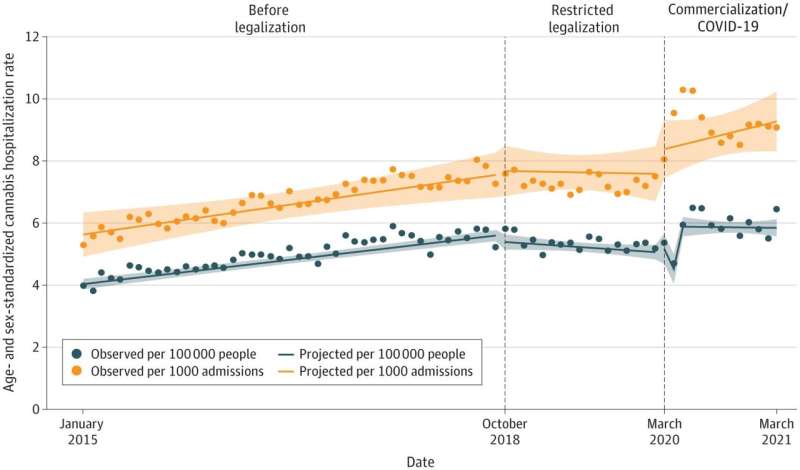Canadian cannabis legalization linked to increased and decreased hospitalization, depending on the province

Research led by the Bruyère Research Institute, Canada, has looked into cannabis-related hospitalization rates before and after cannabis legalization in Canada.
In a paper, "Changes in Cannabis-Attributable Hospitalizations Following Nonmedical Cannabis Legalization in Canada," published in JAMA Network Open, the team finds links between rapid commercialization and the COVID-19 pandemic.
The study found 105,203 hospitalizations due to cannabis in Canada's four most populous provinces of Ontario, Quebec, Alberta, and British Columbia, covering the period from January 2015 to March 2021. The most significant relative increase in hospitalizations was for cannabis-induced psychosis.
Legalization with restrictions was associated with a gradual decrease in hospitalizations due to cannabis. The later rise of stores, cannabis products and the COVID-19 pandemic were associated with a sharp increase in cannabis-related hospitalization, with the exception of British Columbia, where rates dropped.
British Columbia, which comprised 25% of study participants, experienced a 10% reduction in hospitalization events after complete legalization and commercialization compared to pre-legalization rates.
Quebec, on the other hand, at 44% of study participants, was the slowest to allow commercialization and maintained stricter limitations on the types of products that could be sold, yet showed a 37% increase in hospitalization after complete legalization and commercialization compared to pre-legalization rates. Alberta showed an 18% increase, and Ontario was at 20%.
The findings suggest that the initial period following legalization in Canada, with tightly controlled products and limited store access, was not associated with increased hospitalizations due to cannabis. Hospitalizations increased sharply following widespread commercialization in some provinces and decreased in other areas.
Associations were seen between expanded access and increased cannabis hospitalizations, particularly for cannabis-induced psychosis. The unfortunate overlap of store and product expansion and the COVID-19 pandemic challenge the explicit attribution of increases to cannabis access alone.
Canada legalized the sale of cannabis in October 2018, with each province and territory creating its own regulations regarding how cannabis would be sold and the types of products that could be allowed. Initially, all provinces in Canada were only allowed to sell dried cannabis.
In October 2019, cannabis producers were allowed to apply to begin selling new high-potency cannabis products, including edibles, vape pens, and concentrates. Most provinces, other than Quebec, allowed these products to come to market starting in early 2020.
Provinces also took differing approaches to cannabis retail store access. Alberta had a rapid expansion of stores and legal sales immediately following legalization. In contrast, Ontario and British Columbia initially had very low cannabis sales and store access, followed by rapid growth beginning in early 2020. Quebec had the lowest per capita stores and sales throughout the study despite having the highest hospitalization increase from start to finish.
The different approaches to legalization allowed the researchers an opportunity to explore how different regulatory approaches to cannabis markets impact the overall burden on public health. Unfortunately, a study related to hospitalization rates that has a pandemic walk through the middle of the critical data collection period has an unavoidable confounding bias.
COVID-19 pandemic aside, other limitations exist in finding associations between legalization stages and hospital visits. One is that the three-year pre-legalization period (2015–2018) already showed a significantly increased trend in cannabis-related hospitalization rates. That trend, provided in the study, appears to have been slowed by legalization.
Another factor is that patients may simply be more likely to seek medical help and disclose cannabis use after legalization when there is less stigma and no fear of criminal prosecution.
More information: Daniel T. Myran et al, Changes in Cannabis-Attributable Hospitalizations Following Nonmedical Cannabis Legalization in Canada, JAMA Network Open (2023). DOI: 10.1001/jamanetworkopen.2023.36113
© 2023 Science X Network
No comments:
Post a Comment